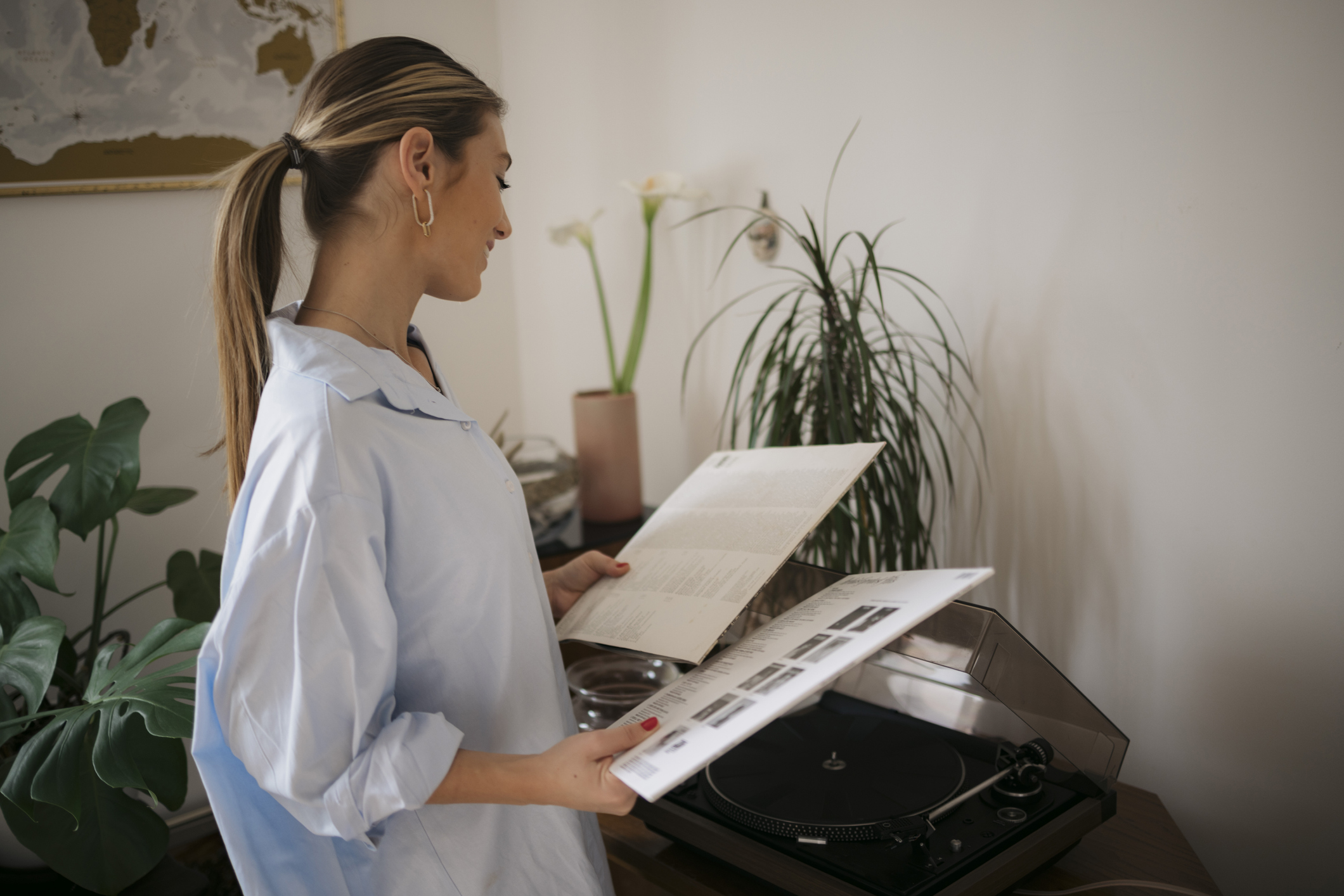Vinyl records are treasures you and your family of music lovers can enjoy for many years. It’s a privilege to pass these down from one generation to the next. Knowing the best way to store albums keeps them well-preserved so future generations can immerse themselves in the same quality of music you have.
Records must be treated with care, as they are fragile and easily damaged. If they get scratched, scuffed, or bent, it can result in skips in the music – or worse, they may not play at all. No matter what age or condition, read on for essential tips on properly storing vinyl records to preserve and protect them.
1. Clean Records Properly Before Storing
The best tool to clean your vinyl albums is a record-cleaning brush. If you’re an avid record collector, you likely already have one, but if not, you can purchase one online or at local music stores. These brushes are a quick and easy way to remove dust and dirt, so you won’t need to take too much time out of your day for upkeep. To use, hold the brush on the record while spinning it slowly.
Some records may require a more thorough cleaning. You can purchase a vinyl-cleaning solution for these records. Spray the solution onto the record, avoiding the record label, and wipe with a microfiber cloth in a circular motion. To keep your record collection looking and playing like brand new, clean with this solution every six months.
When you clean your record with a wet solution, you must let it dry before storing or playing it. “You don’t want to play a record wet, or worse, return it to a sleeve while damp,” explains Marc Henshall, founder of Sound Matters. “Dish racks make superb air-drying stands.”
Following proper cleaning practices before storing your records is important to avoid damage. Avoid one of the common mistakes people make: using t-shirts to clean records. No matter how soft or clean you think your shirt is, the fibers and traces of dirt can scuff and scratch your vinyl.
2. Store Records in their Album Jackets
As a rule of thumb, the only time your record should be outside of its album jacket is when it’s being played. Records should be put away as soon as you are done listening to them. Even leaving it in the turntable isn’t advisable. Dust and dirt can accumulate on the vinyl, impacting sound quality.
If the outer sleeve has become lost or damaged, purchase plastic sleeves for your record. To avoid damage to the vinyl album, choose a plastic sleeve that is the appropriate size for the type of record you are storing. Sleeves that are too loose or too tight could affect the vinyl material.
3. Keep Vinyl Records Upright
The best way to store albums to ensure they stay in good condition is in an upright, vertical position. Vinyl records that have been stored at a slant for an extended period of time can warp due to uneven pressure. This is why records are often kept in crates that position them upright. When storing vinyl records vertically, you can use crate dividers to ensure your records stay evenly upright with little or no slanting.
What is the Best Way to Store Albums?
The best way to store albums is vertically and in a temperature-controlled environment. You always want to store your records after they have been properly cleaned and lined upright with no slanting. Records can be stored in locations that are cool, dry, and away from direct sunlight.
Can You Store Record Albums in Plastic Containers?
Yes, plastic containers are one of the best ways to store albums. Choose a heavy-duty plastic container such as a crate or a bin for a storage solution. Leave the plastic container open instead of using a lid, as the trapped air inside the container could alter the climate and cause damage.
4. Don’t Stack Vinyl Records
Storing records flat and stacked on top of one another could cause permanent damage to your vinyl albums. The weight can cause harm, whether stored in their jackets or not. “Vinyl records are not made to accommodate holding any weight,” explains Matt Robbs from Retro Only, “and once the extra weight is placed on them, it creates several problems.”
Weight on horizontal vinyl can warp over time and possibly crack or create scuff marks, especially for records placed on the bottom of a stack. It is possible to fix a warped record, but you risk causing further damage and may prevent it from lasting long-term. Aside from damage to the vinyl, you also risk destroying the stunning album jacket artwork.

5. Maintain Proper Temperature Control
The location you choose for storing your records must be one that won’t cause damage to vinyl albums. When stored in areas with high heat or direct sunlight, the vinyl could warp and the artwork fade. Instead, records storage should be in areas that are cool in temperature and away from direct sunlight.
If you don’t have a room in the main areas of your home to store records, the next best way to store albums is in an attic or basement. Records will be safe from damage if the locations don’t get too hot or are in direct sunlight. Using a long-term, monthly storage unit can be an excellent option as long as you know how temperature is controlled in the building.
How Long Do Vinyl Albums Last?
The longevity of vinyl records depends heavily on how well they are taken care of. Records can last up to 100 years as long as they are properly cleaned, and you are storing your records vertically in a cool, dry place. Vinyl records are made with PVC (polyvinyl chloride), a durable material that won’t deteriorate easily. Don’t worry about enjoying your records as often as you like. Playing records won’t cause damage over time.
6. Play Records Properly
To maintain the integrity of your records, you want to follow best practices for playing them. When you pick up your record, avoid touching the surface. You inadvertently transfer oils from your fingers to the vinyl by touching the record’s surface. Over time, this can greatly affect the quality of the record, especially if it’s not cleaned before storing. Pick up records by the edges instead.
Is it OK to Store Vinyl Records in a Storage Unit?
Yes, storing vinyl records in a climate-controlled storage unit is a safe option for protecting the album’s integrity. As long as the records are stored upright in the unit, a storage unit will work well. When looking for a proper storage unit to rent, ensure the location you choose is temperature controlled, as units that get too hot could cause damage to the vinyl.
Maintaining Vinyl Records for Decades to Come
If you are a part of a musical family and strongly desire to hand down your vinyl collection, take proper care of your musical legacy. By following these tips on the best ways to store albums, generations of family members can find the same inspiration and love for these collectible items you have cherished over the years.
Did we forget any vinyl storage and maintenance best practices? Let us know in the comments below!
More Resources:
Updated 4/4/23 from an article originally published 9/29/15.






